|
37 Folkestone Road
  
19 Folkestone Road
  
Dover
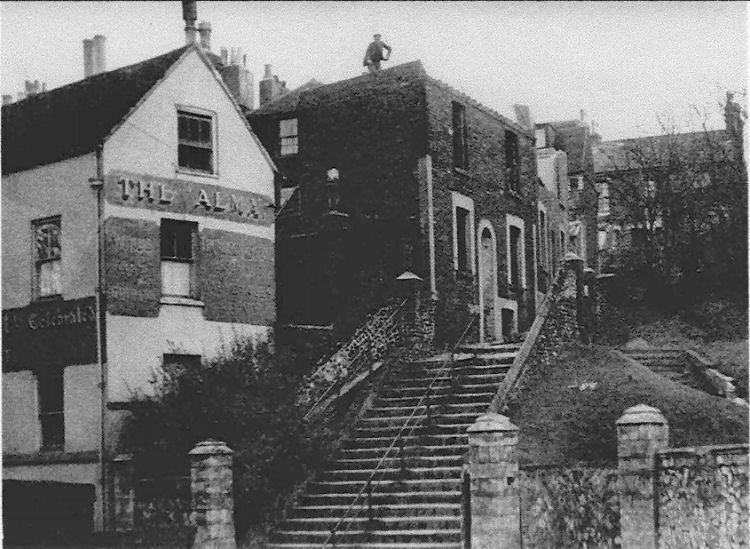 Alma, date unknown. Notice the man on the roof of the now demolished
house up the steps to Military Hill. |
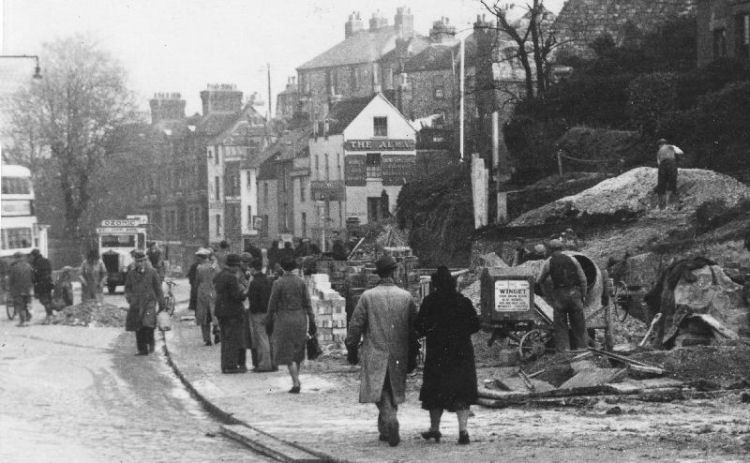 Above photo kindly supplied by Jeanette Harper, c/o
Jackie Bowles of the Louise Armstrong.
Date 1937. |
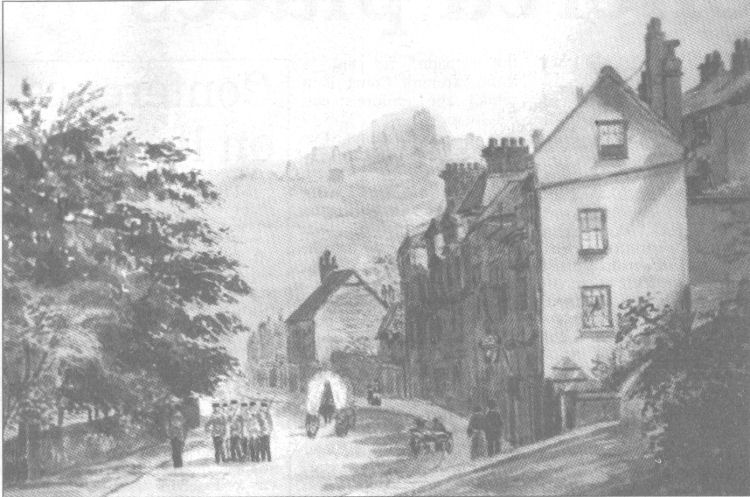 |
|
Days before the trams arrived.
MISS Mary Horseley set up her easel in the churchyard of Christ
Church in 1897, just before the trams arrived.
The covered wagon was coming up the hill, probably delivering flour
to one of the local bakers.
On the left, you can see a squad of soldiers marching up to board a
train at Dover Priory.
On the right, you can see the Alma pub.
Some years ago, I decided to get a similar angle, before the flats
were built, but I had to abandon the attempt. I was nearly in position
when I spotted two sleeping bags with an attractive young lady in one.
But the other contained a very bearded man just waking up. I decided
not to press the shutter and beat a retreat!
Joe Harman
|
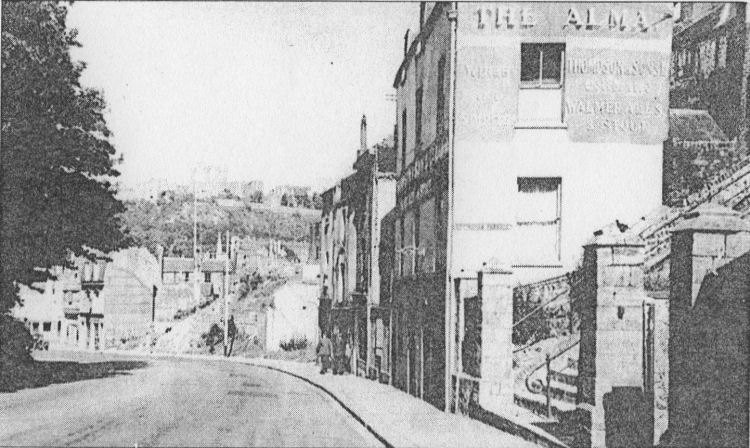 |
|
Above photo appeared in the Dover Mercury 15 July 1999
SOME parts of this stretch of Folkestone
Road have not changed much since this picture was taken around 1950. But others are very different. The steps leading up to
Military Hill are still there, as is the Alma pub, although it is now
called The Renassance.
The buildings beyond it have long gone making way for the
improvements to the road and the York Street roundabout. Those buildings
included an office block, which used to be used by a travel company, the
Red Cow public house and Lewis's garage. |
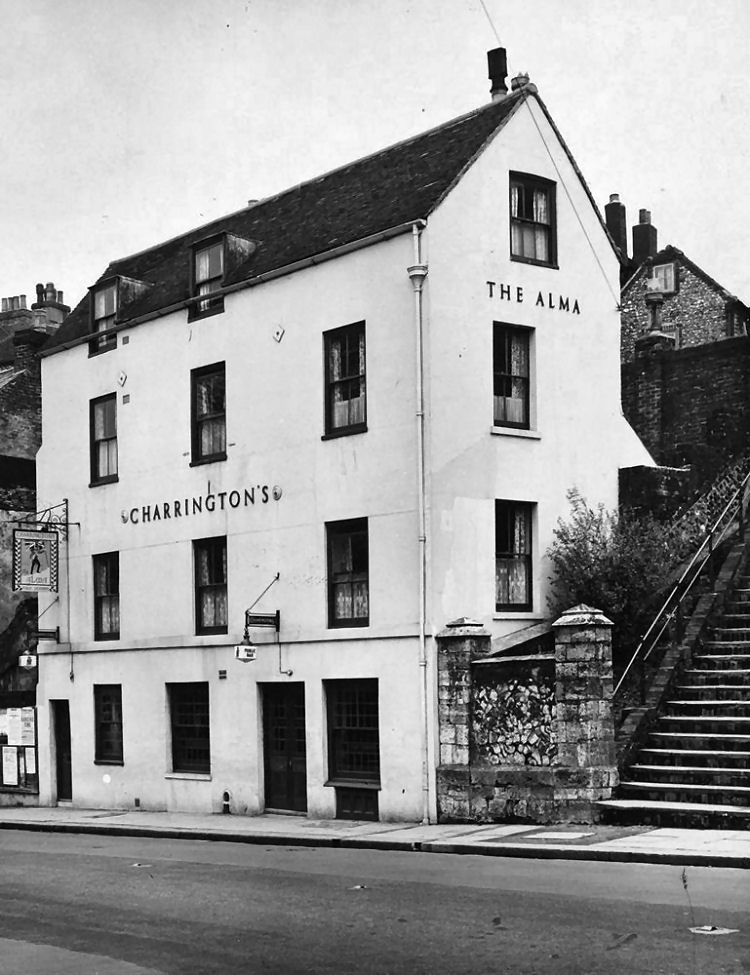
Above photo, 1952.
Creative Commons Licence. |
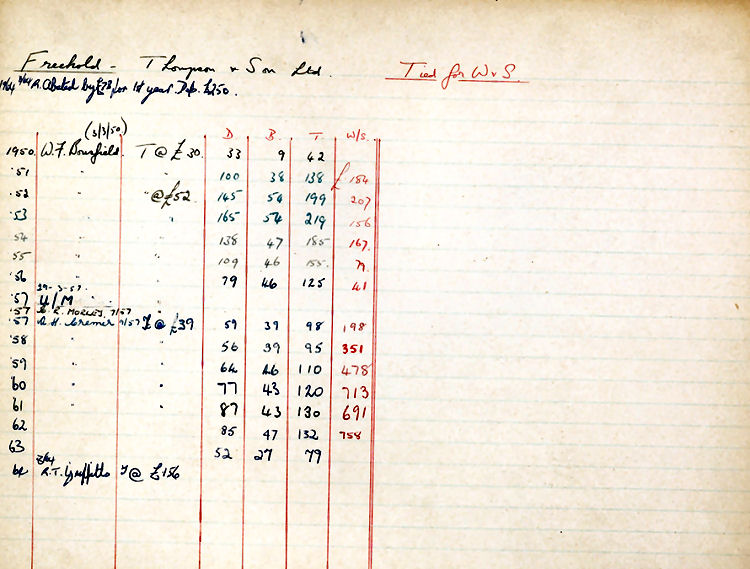
Thompson & Sons ledger.
Creative Commons Licence. |
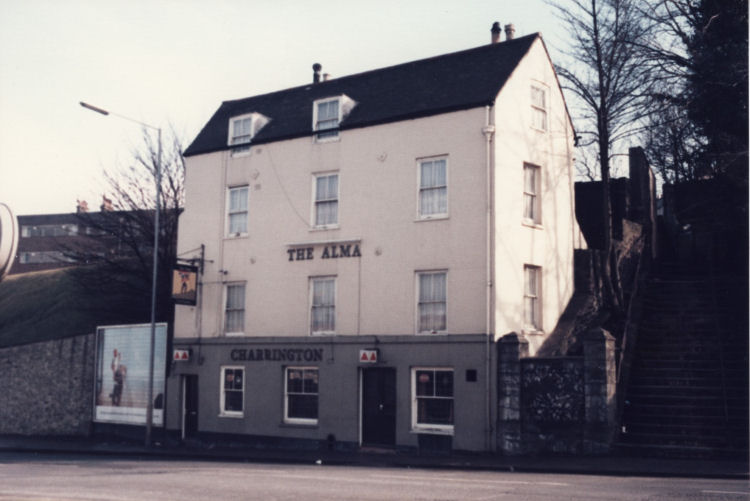
Alma circa 1987 (Photo by Paul Skelton) |
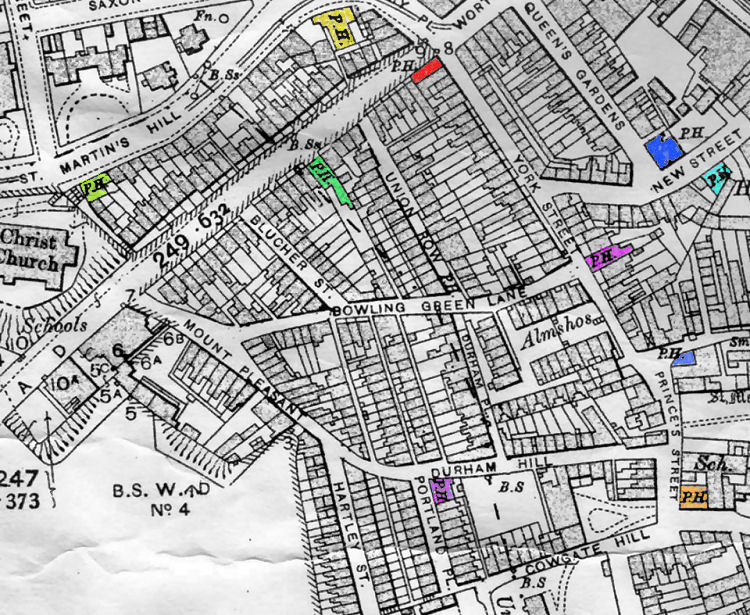
Above photo 1907. Alma is highlighted light Green, St Martin's Hill. |
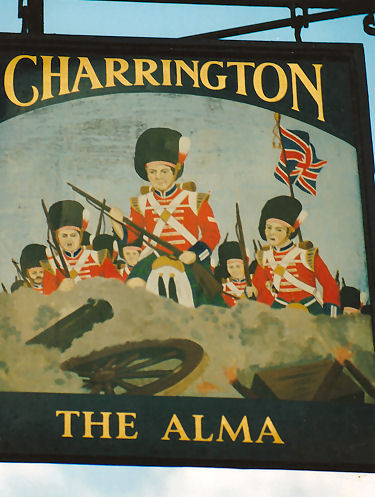 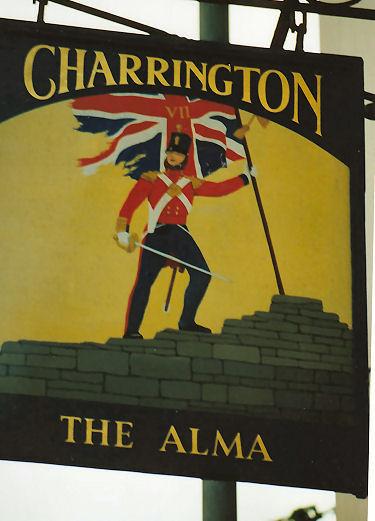
Alma signs above, October 1991.
Above with thanks from Brian Curtis
www.innsignsociety.com
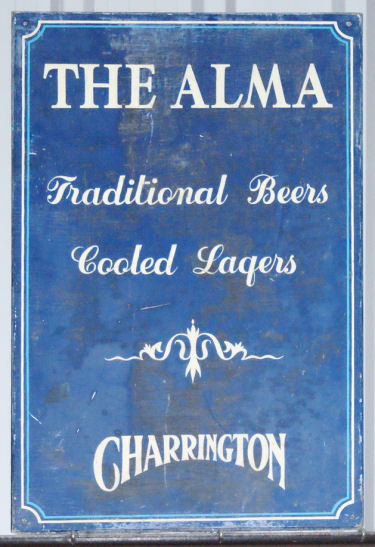
Above sign I am not sure where it was displayed, but I am informed it
is now housed in someone's shed. |
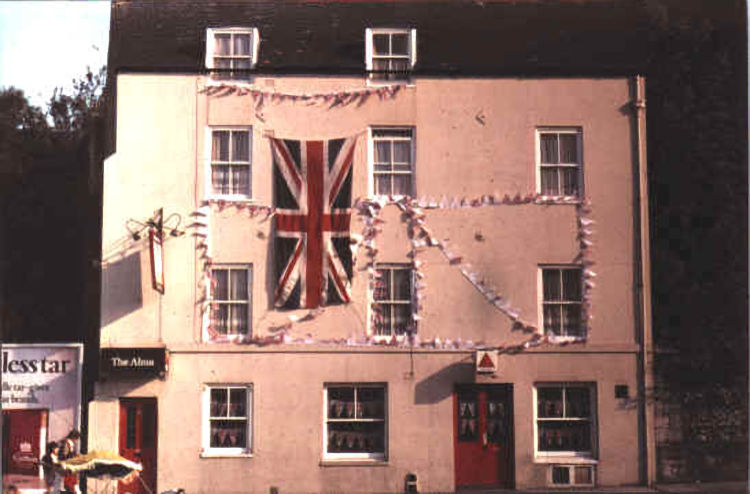
Above photo, 1977, celebrating the Queen's Jubilee. |
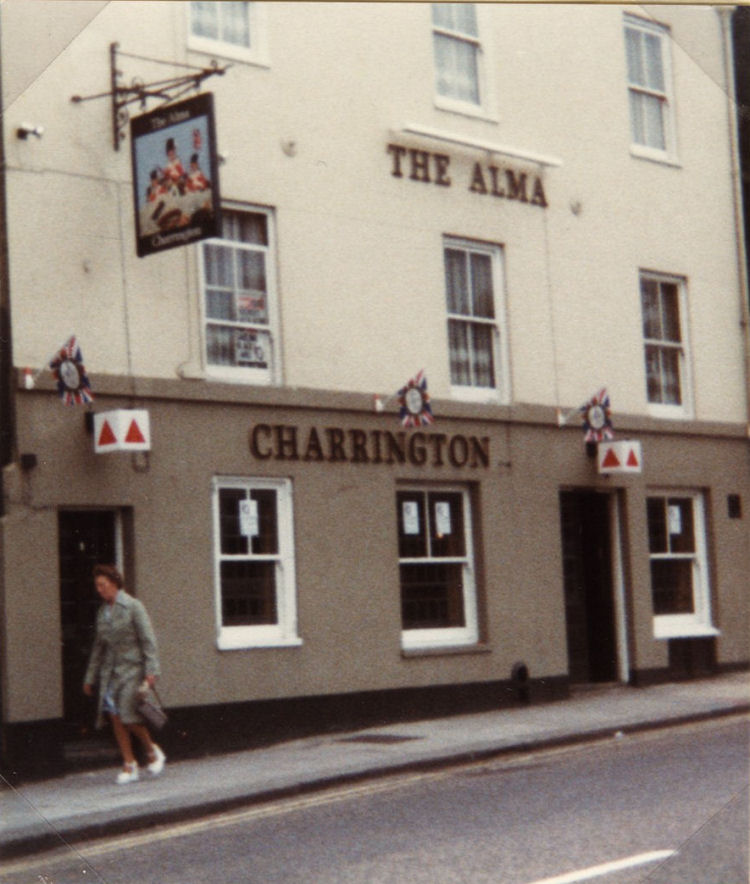 |
|
Alma circa 1980, photo supplied by Barry Smith |
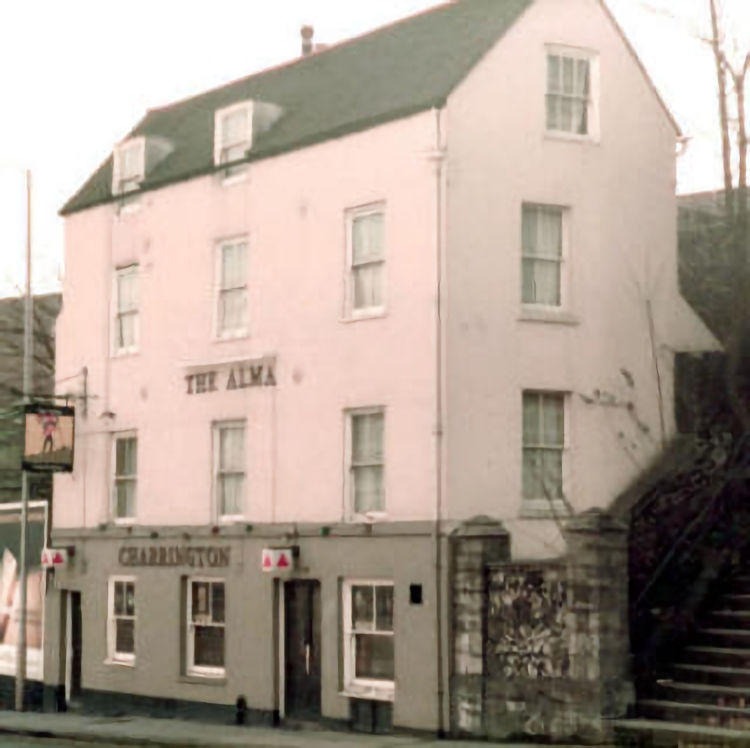
Above photo, 1983. |
The battle of Alma was fought in 1854 which may suggest
the origin. I have no evidence, and later, in 1857, when new houses were
built on this side of the road, I was again disappointed to find no mention
of the name or evidence of rebuilding. A year later, Mrs. Paramour was
rising early to open the doors at five a.m.
Two other pubs with this title were reported in 1856. The
first in Laureston Place and the other in Snargate Street. Unfortunately no
numbers were shown.
There is also mention of a LOWE Joseph the Alma, Snargate
St 1857, but I am unaware of another public house of that name in Snargate Street.
|
South Eastern Gazette, 27 November, 1860.
Death.
On the 19th inst., at the "Alma Inn," Folkestone-road, Dover, Mr.
William Paramor, aged 66.
|
|
From the Dover Express and East Kent Intelligencer,
4 November, 1865. Price 1d.
SUSPENSION OF A CONSTABLE
On the complaint of Woodgate and Pain, the defendants in a previous
case, from when it appeared that police-constable Solly had been
drinking in their company at the "Alma" public-house, Folkestone Road,
while he should have been on duty, Solly was suspended till the
following day, when the Watch Committee, it was intimated, would
consider the complaint and deal with it as they might think proper. A
report of the Watch Committee proceedings will be found elsewhere.
|
|
From the Dover Express and East Kent Intelligencer, 6 April, 1871. Price 1d.
FATAL ACCIDENT AT A RAILWAY STATION
An inquest was held by the Borough Coroner (W. H. Payn, Esq.), on
Saturday afternoon, at the “Alma Inn,” Folkestone Road, on the body of
James Pattenden, aged about 35 years, who met his death the same morning
by being run over by a light engine on the London, Chatham and Dover
Railway line, between the priory Station and Kearsney.
John Lewis deposed: I am an inspector of telegraphs, employed by the
Government Postal Telegraph Department, and reside at Canterbury. I have
known the deceased for seven months, and his name was James Pattenden.
He was employed by me as a labourer to assist in erecting the telegraph
wires. He went to his work at the regular time, six o'clock, this
morning. He was engaged with other workmen in erecting telegraph wires
between Dover and Kearsney. The last time I saw him alive was about a
week ago. I only heard of his death on my arrival in Dover this morning
from Canterbury. I believe a telegram was sent to me, but I did not
receive it as I had started for Dover at the time. He was a very steady
and temperate workman, I know nothing of the circumstances of his death.
Thomas Baker, a labourer, employed by the Government Postal Telegraph
Department, deposed: I was engaged this morning in working on the line
between Dover and Kearsney, and the deceased was employed on the same
work. This morning, about 7.35, the deceased was working by himself on a
telegraph post on Crabble bank. The line at this point is rather curved,
but from the bank where he was at work – the left bank going towards
London – a good view could be got for some distance up the line. I asked
him to come down from the post and go to the Kearsney station to fetch
some material. He lowered his ladder, and started on his way up the
line, and it was while he was going there that the engine overtook him.
When I saw him last he was walking alongside the rails on the left-hand
side. I went in the opposite direction, towards the Priory. When I got
there I saw the engine standing alongside the platform, and one of my
mates called me and told me “Poor Jim was killed.” The deceased's body
was on the tender, covered in straw. I looked at the body, and seeing he
was dead, I cut his shoes off. He was very much injured. The engine at
the station was the same engine and tender that had passed me
half-an-hour previously. The engine was going by itself in the direction
of Canterbury. From what I had heard a goods train had broken down, and
this engine had brought it to Dover, and was then returning. The return
of the engine was not expected; the workmen would not know the exact
time of its return. It was a kind of extra train. I know nothing of the
circumstances attending his death. It was about a third of a mile from
where I left the deceased that the accident happened. I think the
deceased must have been crossing the line, not expecting a train at that
time, it being too early for the ordinary 7.45 train.
By a Juryman: The deceased was rather deaf at times.
William Clews deposed: I am the fireman of the engine “Tiger,” in the
employ of the London, Chatham, and Dover railway Company. The engine
driver's name is Chissell, and at the time of this accident we were
going towards Canterbury. On going round a bit of a curve near Kearsney
I perceived the engine run over some one by the stones flying up on the
foot-plate, and on looking round perceived the remains of a man lying on
the line, about 150 yards from the distance signal. I could feel no
motion as of any obstruction at the time. I did not see anyone on the
line as we advanced. We were going at the rate of 14 miles an hour. It
was a special engine and perhaps would not have been expected by the
workmen. We were returning to Chatham having brought a goods train down
to Dover. At the time of the accident the engine driver was looking
through the glass right a-head, and I was filling the boiler up.
Chissell did not say he saw anyone.
By a Juryman: There is not any obstruction on the line in front of the
engine.
Edward Chissell, deposed: I am the driver of the engine “Tiger” and in
the employ of the London, Chatham, and Dover Railway Company. This
morning I was going from Dover to Chatham, having previously brought a
goods train here. The engine of the goods train broke down at Chatham,
about three o'clock this morning. I was going towards Kearsney, when I
saw the stones fly up on to the foot-plate. I was certain something was
the matter under the engine. As soon as the tender got far enough for me
to see, I looked behind it and saw the remains of deceased lying on the
line. I was keeping a good look out at the time. I had not had any
meals. We did not have time to get anything at Dover, as we had orders
to proceed back to Chatham directly. I had nothing to drink at Dover,
except some tea, which I had brought with me, and my fireman had the
same. I had no spirits. The deceased could get before us suddenly by
stepping from the bank. I started from Chatham this morning at 3.45 and
was returning at 7.24. I have been in the company's employ for the last
nine years, and have never had an accident before this. There was no
occasion to blow the whistle this morning. We never do unless we see
anyone on the line in front of us. The body of the deceased was lying on
the up line.
By a Juryman: It was not foggy this morning, it was very clear. I should
not have known I had run over deceased had not the stones sprung up on
the foot-plate. I should have gone on without knowing it.
Mr. Ashby Greenough Osborne, a surgeon practising at Dover, deposed:
this morning about a quarter to eight, I was summoned to the Priory
Station to see the body of the deceased. I went immediately and found it
lying in a tarpaulin sheet in the station on the platform. I examined
him and found a severe scalp wound on the left side of the head, another
wound on the lower lip, the right arm torn off above the elbow, and a
wound on the left side of the abdomen, through which some intestines
protruded. There was also a compound fracture of the left thigh, high up
– in fact it was quite smashed. Death must have occurred very shortly,
almost immediately, after the accident from loss of blood and the shock
to the system.
The Jury, after consulting amongst themselves for a few minutes,
returned a verdict of “Accidental Death,” and absolved the railway
authorities from all blame in the matter.
Mr. Cox, station-master at the Harbour Station, Mr. B. F. Wright, of the
locomotive department, and Mr. Kift, travelling inspector of the London,
Chatham, and Dover Railway, were present during the enquiry.
|
|
From the Dover Express and East Kent News, Friday, 6 October, 1871. Price 1d.
SERIOUS CHARGE AGAINST A RAILWAY GUARD
William Smith, a man about forty years of age, of respectable
appearance, and in the employ of the London, Chatham, and Dover Railway
Company as a goods' guard, was charged with an assault of a serious
nature upon a little girl eleven years of age, the daughter of Mrs. Jane
Paramor, the landlady, of the “Alma Inn,” Folkestone Road, in a railway
carriage, on the premises of the company's station at the Priory, on the
previous Thursday afternoon.
Mr. Moores, an inspector of the London, Chatham, and Dover Railway, said
he had been instructed by the Manager to attend and watch the case on
behalf of the Company, and to answer any question that their worships
might think proper to put to him as to the prisoner's character. At the
same time, he begged permission to state that he had consulted the
prisoner, who had asked him to crave their worships' indulgence for a
remand, so that he might be enabled to procure the attendance of a
solicitor. He (Mr. Moores) had received a telegraphic message apprizing
him of the circumstances only late on the previous night, and there had
consequently been no opportunity of doing this.
The Magistrates said they had no objection to granting a remand,
although they must first hear some evidence, as to determine whether the
prisoner ought to be detained at all.
The following witnesses were then examined:-
Thomas Stream: I live at 2, Tower Hamlets, and am an engine-fitter's
labourer in the employ of the London, Chatham, and Dover Railway
Company. On Thursday afternoon last about four o'clock, I was engaged in
removing bricks from the back of the engine-shed, at the Priory Station,
when I saw the complainant, Fanny Paramor, come through the workman's
gate near the railway, in company with the prisoner. Both went towards
the carriage shed. The prisoner came through first, and the little girl
followed.
George Hammond: I live at 1, St. George's Street, and am an
engine-cleaner in the employ of the London, Chatham, and Dover Railway
Company. On Thursday afternoon I was employed with the last witness, in
removing bricks at the back of the shed, when I also saw the complainant
come in at the gate leading from Folkestone Road. She came in just
behind a man, but I should not be able to identify him as the prisoner.
The witness then asked to look at the prisoner; but he failed to
recognise him as the man he had seen.
Witness: The man said the little girl went towards the engine shed; but
I saw no more of them afterwards.
William Palmer: I live at the “Alma Inn,” Folkestone Road, and am a
platelayer on the London, Chatham, and Dover Railway . the complainant
is my niece. On Thursday afternoon, about twenty-five minutes past five,
as I and four other men in the employ of the Company were standing
beside the tool-box at the Priory Station, I heard a child screaming. I
went towards the carriage shed, from which the screams proceeded, when I
saw the complainant stepping out of a third-class carriage. She cried
out, “Uncle, uncle, a man has got me in the carriage.” I asked her where
the man had gone to, and she said she did not know. I asked her what he
had been doing; and in consequence of what she told me I called one of
the other men. As I was speaking to him I saw the prisoner leave the
shed and cross the line. I called to the spot all the porters who were
engaged about the shed; but the complainant said the man was not one of
them, but that he had a cover on his cap. When I saw the prisoner cross
the rails he was fifty or sixty yards away from me.
By the Bench: The prisoner did wear a cover on his cap.
It was determined that the prisoner should be remanded at this stage of
the proceedings; and after some conversation it was arranged to adjourn
the further hearing to Saturday (to-morrow), the Magistrates offering to
accept two sureties of £20 each for his appearance.
|
|
From the Dover Express and East Kent Intelligencer, 25 October, 1871. Price 1d.
FATAL ACCIDENT
On Monday afternoon last, while a bricklayer named Charles Toms, in the
employ of Mr. G. Crothall, was employed on the premises of the London,
Chatham and Dover Railway Company, at the Priory Station, in some
drainage excavations, a portion of the ground which had been excavated
gave way, and although the debris did not extend higher than the
unfortunate man's stomach, the weight of earth was so considerable as to
destroy life. It is calculated that not more than five minutes elapsed
from the fall to the time of the poor fellow's complete liberation, yet
it is doubtful whether he had not ceased to live some time before the
whole of the earth had been removed, his last words being “My poor wife
and family!” The deceased leaves a wife and four children.
The Borough Coroner, W. H. Payn, Esq., held an inquest on the
unfortunate man's remains on the following afternoon. (Tuesday), at the
“Alma Inn,” Folkestone Road.
Mr. J. Palfrey having been chosen as foreman, the Jury proceeded to view
the body and also the spot at which the accident occurred. It seemed
that the deceased was engaged in laying bricks at the bottom of a
man-hole, the hole being about seven feet square. On one side of the
man-hole, there was a cutting leading into it, at some few feet higher
level, and a fellow workman was employed in the cutting when the earth
gave out. He shouted to the deceased, who had time only to stand with
his back against the cutting when the mass fell upon the lower part of
him, jamming him completely in. Had he had sufficient time to have
leaped into the cutting, the probability is that he would have remained
uninjured. The Jury having carefully examined the scene of the accident,
and returned to the Jury room, the following evidence was adduced:-
William Toms: I reside at Tower Hamlets, and am foreman of sawmills, in
the employ of Mr. P. Stiff. The deceased was my brother, and was 43
years of age. He was a bricklayer in the employ of Mr. George Chrothall,
and lived in Hartley Street, Durham Hill. I know nothing of the
circumstances attending his death. He was very temperate and sober in
his habits, and was a good skilful workman. He was a married man, and
leaves a wife and four children.
Thomas O'Flaherty: I am an executive, living at 2, Ladywell Court, and
am in the employ of Mr. G. Crothall. I was employed yesterday in company
with the deceased, near a shed at the Priory Station of the London,
Chatham and Dover Railway. We were employed on some drainage work, lying
between the Folkestone Road and the Railway Station. About three o'clock
in the afternoon the deceased was at work, laying the brickwork in a
man-hole, which forms part of the drainage system. I was at the same
time employed in excavating a drain leading to the manhole, and was
within two feet of the deceased, when he asked my opinion as to the way
in which the pipe should come into the man-hole. As we were talking I
perceived the lower part of the earth giving way, and I exclaimed, “Look
out!” It was an impossibility for him to get out. The effect of the slip
was to fill up the hole with earth as high as the deceased's stomach. He
cried out to be released, and I immediately set about removing part of
the earth, and tried to encourage him. He kept crying out, however,
while I was removing the earth, as though in much pain. It took merely
five minutes to get him out. Immediately after getting him out he
appeared to become insensible. His last words were, “My poor wife and
family!”
By the Coroner: We do not generally prop the earth up in excavations of
that width and depth. The depth was 7 feet 3 inches originally, but he
was 9 inches about that, as he had laid three courses of brick. The soil
was clay, which is not generally inclined to give; but it had been
disturbed once before for drainage purposes. The width was the same as
the depth. It was a perfectly square hole. I have been an excavator all
my life, and I should have thought there had not been the slightest
danger in this case. The deceased had assisted me in the same work from
the beginning, and we had both been working in the whole the day before.
The only way I can account for the accident is that the ground is made
ground, and would be likely to be affected by the recent rains. Perhaps
about a ton of earth fell altogether, but only a portion fell upon the
deceased the deceased was a sickly man.
Another workman was in attendance; but the evidence he was prepared to
give as to the cause of the accident was only a repetition of
O'Flaherty's testimony, and the Coroner did not, therefore, think it
necessary to examine him. In reply to the doctor, however, the witness
said that, before the deceased was liberated, he turned pallid and blue,
and vomited slightly.
William George, inspector of permanent way in the employ of the London,
Chatham, and Dover Railway Company: It is my duty to inspect all works
on the Company's premises. I visited the excavation in question at 8
o'clock yesterday morning, and from my examination of it, I considered
it safe. If I had not, I should have ordered it to be timbered. I
consider the falling in of the manhole was owing to the previous
disturbance of the earth for laying of other drainage. This had probably
left some loose earth between the old drain and the new excavation; and
this caused the side of the manhole to give. This defect could not have
been observed; and I consider the falling in of the earth entirely
accidental.
Thomas William Colbeck: I am a surgeon residing and practising in Dover.
Yesterday afternoon, a few minutes after three o'clock, I had just
arrived at the station by a down train, and upon alighting from the
carriage, I saw some men carrying something which looked like a
stretcher across the line. Thinking there might have been an accident I
went up to them to see if I could render any assistance. I saw the
deceased, who appeared to be quite dead. I accompanied him to a shed, to
which he was carried, where I examined him. I found no external wounds,
nor evidence of any fractures; but from an examination of the scene of
the accident, and from the evidence I have heard today, I think it
probably that he died from the shock of the blow, and from the great
pressure of the earth upon him.
The Jury, without hesitation, returned a verdict of “Accidental Death.”
|
A one time outlet of Thompson and Son, the number once read 19. It
changed when various terraces were incorporated into the numbering of the
road and was number 37 by 1913.
|
From the Dover Express, Friday 4 September 1914
LOCAL LICENSED VICTUALLER IN MILITARY CUSTODY
CURIOUS CASE
At the Dover Police Court on Monday, before Messrs. J. Scott (in the
chair) and W. D. Atkins.
Mr. Ledbury, of Messrs. Thompson and Son (brewers), applied for the
temporary transfer of the licence of the "Alma," Folkestone Road, from
H. Wurz.
The Chief Constable explained that it was case where the licence was
held by a German subject, who was given a permit to remain in the town.
His conduct had not been satisfactory, and, in consequence, the Fortress
Commander felt it desirable that the man should be sent to the Castle.
He was taken there on Friday and was being detained by the Military
Authorities. He had signed the necessary notices as to the transfer.
There was nothing against the character.
Mr. Ledbury said that the licensee's wife was a British subject and
the brewers asked that she should be allowed to remain as it was her
only means of earning a livelihood. The Military Authorities were
prepared to agree.
The Chief Constable said that he had no objection, and the
application was granted.
|
|
From the Dover Express and East Kent News, Friday, 12 February, 1915. Price 1d.
THE ALMA TRANSFERRED
At the Dover Police Court on Monday, before Messrs. F. W. Prescott and
W. D. Atkins, the licence of the “Alma,” Folkestone Road was transferred
to William Wilshire, who had been employed at the Dover Gas Works as
a stoker for the last 24 years. The licence has for some time past been
held by the secretary to the brewers, Messrs. Thompson, the last tenant
having left owing to his being of German nationality.
The Chairman: Are you going to keep on at the Gas Works, or give your
whole attention to the house?
Applicant: I shall keep on there until I see how things go.
|
|
From the Dover Express and East Kent News, Friday, 9
October, 1931. Price 1½d.
LICENSING TRANSFER SESSIONS
Licences for music and singing to George William Woodard of the "Alma
Inn," Folkestone Road, Dover.
Mr. Chitty, who appeared on behalf of Mr. Overton, said that although the
hall was really for private dancing lessons, the applicant wished to have
social or public dances occasionally.
The Chief Constable said that the hall was 60ft by 18ft, and had two
exits and accommodation.
|
|
Dover Express 29th August 1947.
TROUBLE AT A PUB SATURDAY NIGHT SCENES.
At Dover on Monday, before Mr. G. Golding presiding, Joseph John Bergin of 2
Effingham Passage appeared on charges of causing damage to the value of £4.
10s to panelling and glass at the “Alma” public house, Folkestone Road, on
Saturday night and of assaulting Thomas John Millen, the manager of the
premises, and his wife, Mrs. Annie Sarah Millen.
Defendant pleaded guilty to the first charge but not guilty to the charges
of assault.
Thomas John Millen said he and his wife were serving behind the bar at the
“Alma” at about 9.45 on Saturday night, when defendant came in and ordered
a pint of AB. A couple who had been sitting in the bar called “Goodnight” as
they went out and it was then that Bergin started becoming offensive. He
broke two pint glasses, the glass and panels of the doors then grabbed hold
of the handles of the beer pumps and said he was going to pull the house
down. Next he got hold of witness and ripped the arm of his shirt.
Defendant, questioning witness, asked if it was not right that he had won
half a pint on the pin table on the Saturday morning, another in the evening
and had been refused both. “After what happened” asked defendant, "Did you
give me the pint I was entitled to and did I sup it and go?”
Witness agreed that, after the trouble, his wife served defendant with a
drink, but said it was to pacify him.
Mrs. Millen said she turned to her husband after defendant started being
abusive to her and said “I can’t tolerate this man. I am going to leave the
bar” Bergin, she said, then called for a drink which her husband refused to
serve and it was then he became really violent. He tried to wrench the clock
from the wall of the bar, kicked in the panel of a door, hit her on the
chest and knocked her backwards on to the wine cabinet, then picked up a
pint glass and threw it at her. After that he went across and struck at her
husband and tore his shirt. Mrs. Millen said she grabbed hold of a stick and
hit defendant with it. He was still calling for drink and, in order to
pacify him, she served him with one, which he drank and then went away.
Thomas Hookings, a pensioner of Maison Dieu Rd., said he was in the private
bar and heard “a bit of an argument going on”. There was the sound of
smashing glass and defendant, coming into the bar where he was sitting,
picked up his pint of beer and threw it at the landlord.
PC Miller said he went to the “Alma” in response to a telephone call at
about 10.15 on Saturday night. Broken glass was lying about, both inside and
outside the premises and the bar was in a state of disorder. He saw Bergin
at his home and asked him to accompany him to the Police Station. Bergin
replied “I am not going”. He was taken to the Police Station where he was
charged and in reply said “I deny all the charges”.
In reply to the Chairman, witness said the defendant had been drinking but
was not drunk.
Defendant, giving evidence, claimed he was owed 6d from the Saturday morning
and another 6d in the evening by Mr. & Mrs. Millen. He said he asked them
for it and Mr. Millen replied “You’re always asking for something”. They
started to have a row and it was when he took the stick away from Mrs. Millen
that the glasses went over and were broken.” Then Mr. Millen came to have a
smack at me”, said defendant “and I had one at him”.
The Chairman, imposing fines of 10s on each of the three charges, told
defendant he would have to pay the £4. 10s in addition to making good the
damage he had caused and advised him to keep away from the “Alma” in future.
Defendant: “Will you put a stop to the gambling machine they’ve got there?”
The Chairman: That’s nothing to do with this case.
|
Serving Thomson and Sons in 1974 this later became a Charington's tied
house.
The pub gained a Grade 2 listing on 17 December 1973.
This later became a free house and trading under the name of
the "Renaissance." However, after that
closed and a cafe opened, that too had a very short time period and closed
within four weeks of opening.
|
From the Dover Express, 27 May 2010
PREMISES ON SALE AS CAFE MANAGERS QUIT.
Health and safety investigation after complaint
received
Report by Yamural Zendera
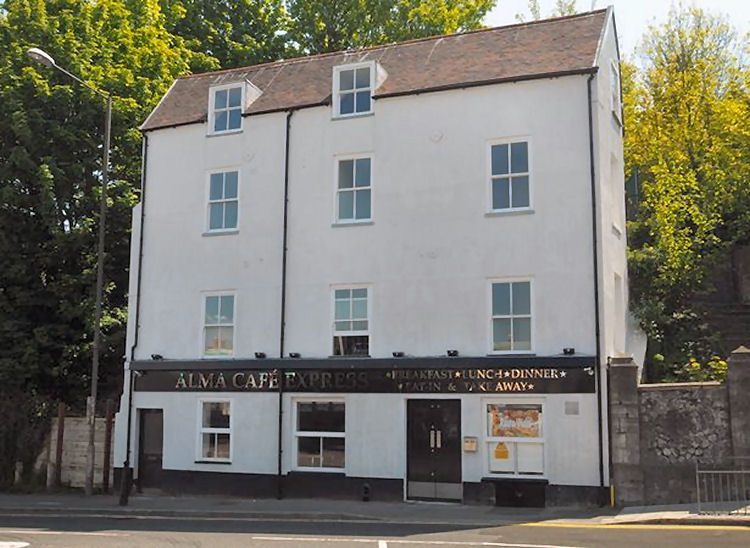
A DOVER cafe that closed within a month
of opening, following a fallout between the owner and the managers, is
being investigated by the district council, the Express has learned.
The
Alma Cafe Express in Folkestone Road, near Dover Priory railway station,
stopped trading when managers Maxine and Grant Simpson, from London,
quit on May 1.
The Express can confirm that health and safety officers
are currently probing a complaint against the business.
Speaking last
Friday, owner
Leo Pushman told the Express he was unconcerned about the investigation.
He said: "I have the letter but I have no idea what they are going to
investigate."
Businessman Mr Pushman said he was expecting health and
safety officers this week. He has put the premises up for sale with a
15-year lease.
It's all a far cry from the cafe's opening on April 9,
when its advertisements promised it would serve authentic cuisine and
drinks, and its arrival was welcomed by users of the Dover Forum website
for bringing an empty building - formerly the "Renaissance" pub - back
into use.
Former managers Maxine and Grant, who have four children between them,
were hired via an employment agency.
The couple moved down from London
on March 30 and were staying in a two-bedroom flat in Worthington
Street. They have returned to the capital.
Previously the pair were
living in Alicante, Spain, for two years, running a bar and restaurant.
Maxine said: "We are just putting it down to a bad experience. We have
just got to move on."
A council spokesman said: "Although we can not
comment on individual cases, health and safety officers are currently
investigating a complaint."
|
LICENSEE LIST
COOMBES Elizabeth 1857
PARAMOR William 1858-19/Nov/1860 dec'd (age 56 in 1861 ) )
 (Extra
history) (Extra
history)
PARAMOR Mrs Maria 1860-89 (age 77 in 1881 ) )
 
PARAMOR William 1889-95 (age 60 in 1891 ) )
 
WHITE James 1899-Nov/1900
 
GEORGE William James Nov/1900-Dec/04
   
CLEARY John William Dec/1904-07
 (Late
Sergeant-instructor of the Border Regiment.) (Late
Sergeant-instructor of the Border Regiment.)
THATCHER Ernest George 1907-09 (HATCHER
 ) )
 TERRY William 1909 0nly
TERRY William 1909 0nly
HATCHER 1909 end
 BOORMAN George 1909-10 dec'd
BOORMAN George 1909-10 dec'd
LAVERTY Percy 1910-13 (age 32 in 1911 ) )
 
 WURZ Henry William 1913-Sept/14
WURZ Henry William 1913-Sept/14
WURZ Mrs Sept/1914+
LIDBURY E J 25/Dec/1914 (Representative of Messrs.
Thompson & Co.) Who had obtained another appointment at Liverpool.

TAYLOR Mr J J (Secretary Messrs. Thompson & Co.)

WATTS H 1915 ?
WILSHER William Feb/1915-Aug/31
     
WOODARD George William Aug/1931-Aug/33
  (Of Gosport,
late Sergeant in Marine Police.) (Of Gosport,
late Sergeant in Marine Police.)
TOWN Thomas John Aug/1933-Dec/34
 (Beckenham grocer.)
(Beckenham grocer.)
DREDGE Bertram Charles Dec/1934-38
 
MILLEN Thomas J 1938-June/49 dec'd
  
MILLEN Mrs Anne Sarah (widow) June/1949-3/Mar/50
 
BOUSFIELD W Frederick 3/Mar/1950-29/Mar/57
 
MORLEY Claude R July-Sept 1957

CREMER Alfred H Sept/1957-Aug/68

 GRIFFITHS R T Aug/1968-70+
GRIFFITHS R T Aug/1968-70+
WHEELER Harold L 1972-78
 Thompson & Sons
Thompson & Sons
VIRTUE Glen 1987

RIPLEY Ian 1993
SPARSHOT Ian 1993
 From Melville's Directory 1858 From Melville's Directory 1858
 From the Post Office Directory 1874 From the Post Office Directory 1874
 From the Post Office Directory 1882 From the Post Office Directory 1882
 From the Post Office Directory 1891 From the Post Office Directory 1891
 From Pikes Dover Blue Book 1895 From Pikes Dover Blue Book 1895
 From the Kelly's Directory 1899 From the Kelly's Directory 1899
 From the Post Office Directory 1901 From the Post Office Directory 1901
 From the Post Office Directory 1903 From the Post Office Directory 1903
 From the Kelly's Directory 1903 From the Kelly's Directory 1903
 From Pikes Dover Blue Book 1909 From Pikes Dover Blue Book 1909
 From the Kelly's Directory 1913 From the Kelly's Directory 1913
 From the Post Office Directory 1913 From the Post Office Directory 1913
 From the Post Office Directory 1918 From the Post Office Directory 1918
 From the Post Office Directory 1922 From the Post Office Directory 1922
 From Pikes Dover Blue Book 1923 From Pikes Dover Blue Book 1923
 From Pikes Dover Blue Book 1924 From Pikes Dover Blue Book 1924
 From the Post Office Directory 1930 From the Post Office Directory 1930
 From Pikes Dover Blue Book 1932-33 From Pikes Dover Blue Book 1932-33
 From the Post Office Directory 1938 From the Post Office Directory 1938
 From Pikes Dover Blue Book 1938-39 From Pikes Dover Blue Book 1938-39
 From Pikes Dover Blue Book 1948-49 From Pikes Dover Blue Book 1948-49
 From the Kelly's Directory 1950 From the Kelly's Directory 1950
 From the Kelly's Directory 1953 From the Kelly's Directory 1953
 From the Kelly's Directory 1956 From the Kelly's Directory 1956
 Library archives 1974 Library archives 1974
 From the Dover Express From the Dover Express
 Census Census
|












